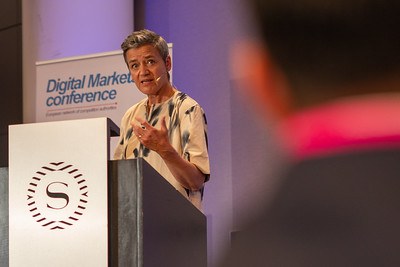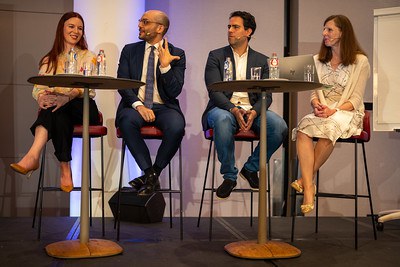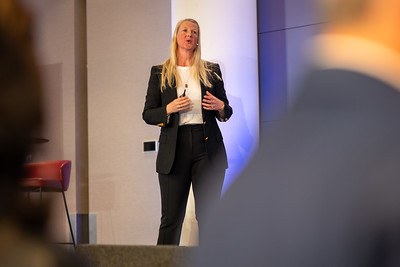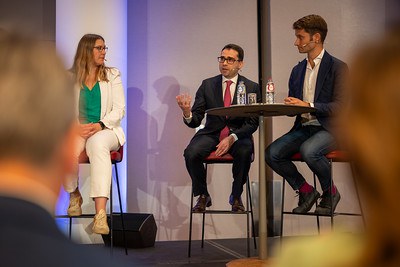Author: Martijn Arets (Website - LinkedIn - Twitter)
Platforms like Google, Apple and Meta are an increasingly important private infrastructure for organising the digital global market. The advantages are clear: these marketplaces make online transactions easy and give developers and sellers low-threshold access to a multi-billion audience. This also gives platforms a lot of power: as 'private regulators', they determine the rules of the game. The user has little say and there is little transparency. And that is dangerous, especially with the rise of AI. This is why the dominance of platforms is under discussion internationally. The European Commission, for instance, is developing all kinds of regulations to protect consumers and entrepreneurs. Think of the DSA, P2B directive, the AI act, the Data act and the Platformwork Directive. The most well-known new legislation is the Digital Markets Act (DMA). Since last year, this should ensure a level playing field for all digital companies.
Yet the DMA only applies to a specific group of platforms. The Dutch national government's website states that the act applies if the platform "provides the same core platform service in at least 3 EU member states" and has had at least EUR 7.5 billion annual turnover in the EU (or a market value of at least EUR 75 billion in the past three years). Furthermore, such a platform must have at least 45 million active end users in the past 3 years and at least 10,000 business users based in the EU. So these are really very large platforms that dominate a market as 'gatekeepers'.
I have been getting involved in issues around a fair platform economy for 10 years and find regulation and platforms a very interesting topic. Thus, at an early stage, I organised the conference Towards Workable Regulation for the European Platform Economy on the potential impact of new legislation. How does it work in practice so far? To find out, national competition authorities organised the ECN Digital Markets Act Conference in late June 2024. Indeed, while legislation is made in Brussels, national authorities are responsible for implementation, implementation and enforcement. Evaluation and dialogue with stakeholders are very important in this regard, especially in a rapidly changing digital landscape.
THE IMPORTANCE OF A LEVEL PLAYING FIELD
During the conference, DMA ‘founding mother' and European Commissioner for Competition Margrethe Vestager stressed the importance of a level playing field. According to her, good legislation promotes innovation. If one company is too powerful, it is not attractive for other entrepreneurs to invest. This is both bad for the market and for consumers. They tend to pay a higher price and innovation is left behind. This is the order of the day in the tech world, as many Big Tech companies are dominating an entire ecosystem. Think of Apple: it owns hardware, the operating system, the app store and the payment system all together. Google and Amazon also play a double role. They are both market authority and participant in their own market. That makes it easy for these types of actors to abuse their power. They learn from entrepreneurs' innovation on their platform and use this data to innovate. And copy the service or product and rank their own offerings higher in search results. Furthermore, they work as gatekeepers: they decide who gets access to the marketplace and under what conditions.

DISADVANTAGES FOR PLATFORM ENTREPRENEURS
What do other entrepreneurs experience from this? During the conference, representatives of Mozilla, DuckDuckGo, Spotify and GetYourGuide, among others, told what obstacles they experience from powerhouses like Google and Apple. One example is free browser choice. Google currently pays $20 billion a year to Apple to put Google Chrome as the preferred browser on the iPhone. A huge amount and unfair to small players. Consumers also suffer. Mozilla research shows that 97% want to choose their own browser, but the vast majority do not change the default setting without a choice option.

Very concrete was the contribution of the Dutch e-commerce platform Bol.com. That suffers greatly from Temu, which underhandedly circumvents European regulations, pays no taxes and imposes itself on European consumers with dangerous goods in questionable ways.

Another example is anti-competitive terms in APIs (Application Programming Interfaces). An API provides other systems and software with an 'entrance' to the system. This allows different systems to communicate with each other and exchange data. In practice, APIs are sometimes available, but the terms of use state that they cannot be used for 'competing services'. Furthermore, APIs are often unstable or changed unannounced.
Finally, appstore terms and conditions are often market-distorting. Those who want to publish a new version of their app are dependent on a party like Google or Apple. In this way, platforms are stuck with a gatekeeper's fees and conditions for life in order to communicate with their own customers.
EVERY PLATFORM IS A GATEKEEPER
I noticed that the gatekeepers themselves were not on stage during the conference. That's a missed opportunity for debate. It was said jokingly, "First the big platforms asked for more regulation. Now that it's there, it's not good either".
Meanwhile, those fighting against big, powerful platforms are gatekeepers themselves to a greater or lesser extent. When Spotify's representative said that "everything is about the user", laughter rose in the room. Whereas Spotify is not always happy with the gatekeepers' choices, musicians and record labels are not always happy with the choices Spotify makes and unilaterally imposes. The music platform regularly makes choices that are more in the interests of its shareholders, rather than the user.

Booking.com is also "selectively outraged". While the platform initially welcomed the arrival of the DMA, it reacted a lot less enthusiastically when it itself was flagged as a gatekeeper. Many of the platform's choices do not benefit users, think of the parity clause: a ban on providers offering their accommodation on other websites at a lower price (in certain countries where such a ban is allowed).
THE MECHANISM OF POWER
I miss a topic in this discussion and also at this event, which is the debate on the mechanism and conditions by which this kind of power structure can grow. Indeed, the example of Booking.com shows that attitudes towards regulation often change when the platform grows and is itself seen as a gatekeeper. We can only prevent this if we address the underlying mechanisms that lead to wrong behaviour every time.
How desirable is buying up and subsidising markets? This strategy is regulation rather than exception in the platform world. For example, Uber was able to grow so tremendously fast for years by investing many billions in venture capital to subsidise driver and customer, at the expense of local markets. This also makes such a company considerably dependent on shareholders. One solution is alternative ownership and governance, think steward ownership and platform cooperatives. Here, the company does not serve the shareholder, but the shareholder and director serve the platform and the target group. Why are users of (infrastructure) platforms not given co-determination and voting rights at the board table, just like a Works Council at a larger company?
Cristina Caffarra of the Centre for Economic Policy Research argues for serious investment in a European 'stack and infrastructure'. Why is the money from the big fines not used to fund this? Besides, it is surprising that the players in the market are so bad at finding each other. The only way to break the power of platforms is to organise. This I still see far too little and that is really a missed opportunity.

TO CONCLUDE: MY REFLECTIONS
Gatekeepers have been able to grow without regulations for years. This has brought a lot of innovation, but it is also clear that they exploit their power. On the hi of the conference, the European Commission published the 6th investigation into the abuse of market power under the DMA. Two hi earlier, Apple announced it would not launch any new AI features for Siri in Europe for the time being due to "ambiguities" posed by the DMA. Nonsense, of course, but they also have a lot to lose.
Caffara calls on Europe to be more ambitious to solve the problems. "In the fight against abuse of power, we now end up 0-0 at best," she said. "We are not playing to win, but we are playing not to lose. That has to change."
While we should expect big players to meet strict requirements, it is nonsense that this stops innovation. When they say that, it is mostly a matter of not wanting to, not not being able to. Be aware of who is saying it and what the interest is and don't be naive.
At the same time, we have to be careful of too many legislations and regulations to keep it workable. The market must also remain accessible to newcomers. Furthermore, it is also a pity if it turns out that we need so many legislations. Are regulation and enforcement our only hope for a fair platform economy? I don't think so, that would be sad. That is why I advocate keeping the energy around the discussion and development of regulations, but also fighting for a fair market in all other ways.
All pictures of this event are on my Flickr page and are free to download (CC-BY)
